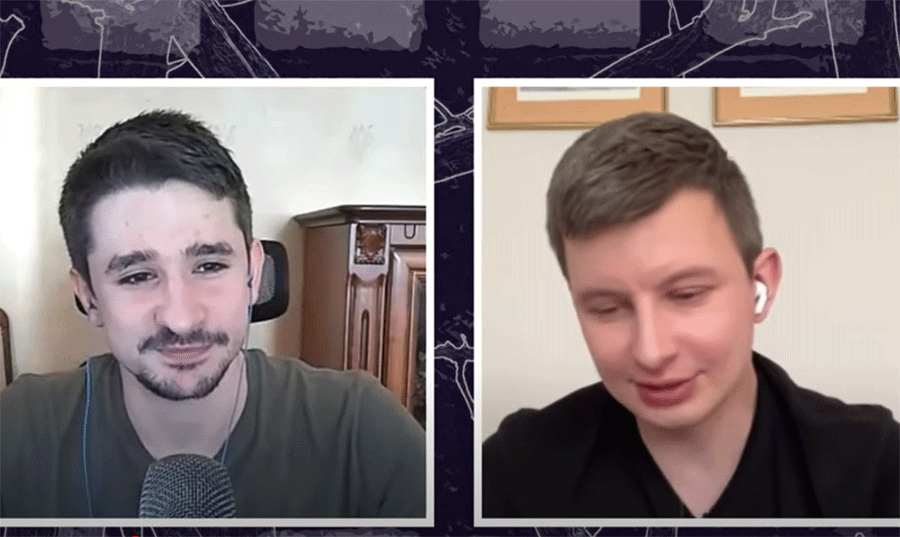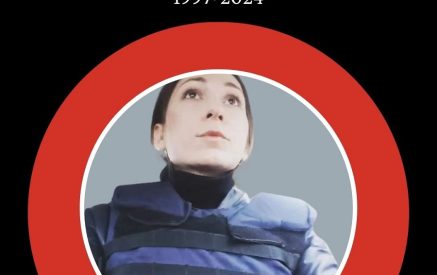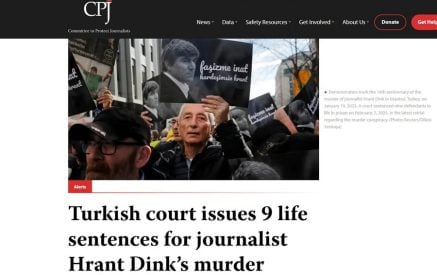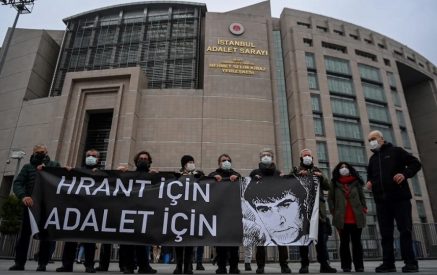New York, August 31, 2023—Russian authorities should not contest the appeals of exiled journalists Ruslan Leviev and Michael Nacke and drop all charges against them, the Committee to Protect Journalists said Thursday.
On Tuesday, August 29, the Basmanny Court in Moscow sentenced Leviev, founder of the Russian independent investigative project Conflict Intelligence Team, and Nacke, a Lithuania-based video blogger, to 11 years each in a penal colony for distributing “fake” information about the Russian military. Leviev was also issued a five-year ban on managing a website, and Nacke was given a four-year ban, Nacke told CPJ via messaging app.
A state prosecutor had previously requested 13-year sentences for the journalists. Leviev and Nacke were not present at the hearing and do not intend to return to Russia to serve their sentences.
“The 11-year sentences handed to exiled journalists Michael Nacke and Ruslan Leviev are proof that Russian authorities’ harassment of those who dare to report independently on the war in Ukraine does not stop at the country’s borders,” said Carlos Martínez de la Serna, CPJ’s program director. “Authorities must not contest the journalists’ appeals, immediately drop all charges against them, and let the press report freely on the war.”
Read also
The journalists were charged over a March 5, 2022, video Nacke posted on his YouTube channel, as well as the journalists’ discussion of Russian military actions in a March 9 and March 16, 2022, video published on Popular Politics, a YouTube channel run by jailed opposition leader Alexei Navalny’s team.
In the March 5 video, Nacke and Leviev discussed the ninth day of Russia’s full-scale invasion of Ukraine, including the March 4 Russian shelling of the Zaporizhzhia nuclear power plant in southeastern Ukraine and the adoption of the law criminalizing “fake” information about the Russian army.
In March 2022, Russian lawmakers changed the country’s laws to impose fines and prison terms of up to 10 years for discrediting or spreading “fake” information about the country’s military.
The court convicted the journalists on three counts—distributing “fake” information as a group, “out of political hatred,” and by creating artificial evidence.
In its Tuesday decision, the court imposed penalties for each offense, according to a lawyer with Setevye Svobody, a Russian freedom of expression legal assistance organization, who spoke to CPJ on the condition of anonymity, citing fear of reprisal.
“This verdict set a very dangerous precedent of adding up punishments for separate offenses,” the lawyer told CPJ. Leviev and Nacke’s sentences are the longest issued under the new legislation so far, according to Nacke and the lawyer, who added that the journalists plan to appeal.
Nacke, who called the verdict “unjust,” “repressive,” and meant to “intimidate all those who publish information about Russian crimes in this war,” told CPJ that the court denied him the opportunity to speak via video, call witnesses, and rejected evidence his defense submitted.
“[The March 5 video includes] footage of the Russian military firing on a nuclear power plant in Ukraine,” Nacke told CPJ. “That is not some speculation of ours, but the facts recorded on video.”
Russian authorities previously labeled Leviev and Nacke as “foreign agents.” Separately, on August 10, the Russian general prosecutor’s office declared the activities of Conflict Intelligence Team as “undesirable.” Organizations that receive the undesirable classification are banned from operating in Russia, and anyone who participates in them or works to organize their activities faces up to six years in prison and administrative fines.
Separately, on June 28, 2023, the Basmanny Court convicted Ilya Krasilshchik, a former publisher of the independent news website Meduza and founder of the independent media project HelpDesk.Media, of disseminating false information about the Russian army and sentenced him to eight years in jail in absentia. The court also banned Krasilshchik from managing websites for four years.
Krasilshchik was charged for an April 3, 2022, post on his personal Instagram account about the Russian military’s alleged involvement in a massacre in the Ukrainian city of Bucha and an April 14 interview with independent Russian journalist Ilya Shepelin.
“I think it’s an honor to be convicted for saying that Russia is responsible for [the] Bucha massacre,” Krasilshchik told CPJ via messaging app. Krasilshchik left Russia in 2022 and does not plan to return to Russia to serve his sentence.
Also, on August 14, Russian authorities arrested in absentia Sergey Podsytnik, an editor with the independent online outlet Protocol.Samara, for distributing “fake” information about the Russian military. Podsytnik, who left Russia in early 2022, will be held for two months if he returns or is deported to Russia.
The charges against Podsytnik, which carry a maximum of five years in prison, allegedly stem from a January 19, 2023, Protocol.Samara investigation into Russian soldiers killed in a Ukrainian strike on the eastern Ukrainian city of Makiivka in late December 2022.
Authorities in Samara have searched the apartment of Podsytnik’s parents and summoned them for questioning. On August 28, Protocol.Samara reported that the investigator in the journalist’ case tried to summon his minor brother for questioning.
CPJ’s emails to the Basmanny Court and the Moscow branch of the Russian Investigative Committee did not immediately receive replies. CPJ’s email to the Russian Investigative Committee’s Samara branch received an error message.
Committee to Protect Journalists

























































